Samsung SSD 840 Pro (256GB) Review
by Anand Lal Shimpi on September 24, 2012 7:00 AM EST- Posted in
- Storage
- SSDs
- Samsung
- Samsung SSD 840
If we had an award for most improved in the SSD space, it would have to go to Samsung. When we first encountered Samsung MLC drives a few years ago they were pretty bad. Prices were high and performance was low. Samsung offered no end-user upgradable firmware for those early drives either, although that was eventually rectified. The first Samsung MLC SSDs were reliable, they just weren't worth the money when you had much better options from companies like Intel.
Samsung had all of the right pieces for success however. Like Intel, Samsung made its own NAND, controller and wrote its own firmware. Unlike Intel, Samsung stuck to the vertically integrated formula.
I remember arguing with Samsung engineers a few years ago about the importance of random IO performance compared to sequential speed. I remember feeling like they were making the same mistake that all SSD makers were making back then: heavily prioritizing sequential IO when it was a failure to deliver good random IO performance as well that really hurt SSD adoption. Although the first Samsung SSDs weren't very good, they got better over time. While the first generation couldn't be recommended, the Samsung SSD 470 could. It still wasn't our favorite drive, but it finally brought performance up to a reasonable level. Last year's 830 release showed us that Samsung woke up. Today, Samsung is adding two new members to the family: the Samsung SSD 840 and the 840 Pro. The former is the first productized consumer SSD to use Samsung's 21nm 3-bit-per-cell MLC (aka TLC) NAND, while the latter is Samsung's new flagship drive using 21nm 2bpc MLC NAND.
Unfortunately we don't have samples of the unique TLC SSD 840, just the MLC 840 Pro. Despite the use of TLC NAND, Samsung claims the vanilla 840 should offer similar performance to the current 830. Samsung also claims that endurance should be reasonable for consumer workloads.
The 840 Pro should be tangibly faster than the 830 thanks to a new controller, new firmware and new NAND:
| Samsung SSD 840 Pro vs 830 | ||||
| Samsung SSD 830 (256,512GB) | Samsung SSD 840 Pro (256,512GB) | |||
| Sequential Read | 520MB/s | 540MB/s | ||
| Sequential Write | 400MB/s | 450MB/s | ||
| Random Read | 80K IOPS | 100K IOPS | ||
| Random Write | 36K IOPS | 78K IOPS | ||
| Active Power Use | 0.24W | 0.068W | ||
| Idle Power Use | 0.14W | 0.042W | ||
While the 830 used Samsung's 27nm MLC NAND, the 840 Pro uses Samsung's latest 21nm MLC NAND. The move to 21nm will eventually drive NAND pricing lower, although today Samsung expects price parity between the TLC equipped 840 and the old MLC 830. The 840 Pro should sell for a 25 - 30% premium over the current 830.
| Samsung SSD 840 Pro Pricing | ||||||
| 64GB | 128GB | 256GB | 512GB | |||
| Samsung SSD 840 Pro | $99.99 | $149.99 | $269.99 | $599.99 | ||
The move to 21nm is also coupled with a move to a 400Mbps Toggle 2.0 NAND interface. Block and page sizes remain the same for 2bpc MLC 21nm NAND, and maximum capacity per die is still 8GB. Although beyond the scope of this article, 3bpc TLC 21nm NAND sees 50% slower program/erase times compared to the 2bpc MLC 21nm NAND.
Both the 840 and 840 Pro use Samsung's 4th generation SSD controller. Samsung's MAX controller was used in the SSD 470, its successor, the MBX controller, wasn't used in retail drives, while MCX debuted in the 830 and MDX is in the 840/840 Pro. The basic architecture of the controller hasn't changed. Internally there are three ARM9 cores now running at 300MHz. Update: Samsung originally listed ARM9 cores but has since told us that there are three ARM Cortex R4s inside of the new MDX controller.
The MDX controller features a hardware AES-256 encryption engine that's managed using a system BIOS password like most other drives in this class.
The MDX controller is paired with 512MB of LPDDR2-1066 in the Samsung SSD 840 Pro, doubling up the DRAM used in the 830 as well as increasing bandwidth to DRAM by 33%:
| SSD DRAM Size Comparison | |||||
| Drive | Controller | DRAM Size | DRAM Speed | ||
| Corsair Neutron GTX | LAMD LM87800 | 256MB | DDR2-800 | ||
| Crucial m4 | Marvell 88SS9174 | 256MB | DDR3-667 | ||
| Intel SSD 320 | Intel X25-M G3 | 64MB | SDR-166 | ||
| Intel SSD 520 | SandForce SF-2281 | 0MB | - | ||
| OCZ Vertex 4 | Indilinx Everest 2 | 512MB/1GB | DDR3-800 | ||
| Samsung SSD 830 | Samsung MCX | 256MB | DDR2-800 | ||
| Samsung SSD 840 Pro | Samsung MDX | 512MB | LPDDR2-1066 | ||
The 840 Pro will be available in 64 - 512GB capacities. Although the controller supports up to 1TB of NAND, Samsung believes that the ultra-high-density NAND required to hit 1TB is too cost prohibitive at this point. Spare area is set at around 7% by default, although users will be able to adjust it via Samsung's SSD Magician utility. The vanilla 840 on the other hand will boast more spare area (likely to help manage endurance on the TLC NAND) and will launch at 120GB, 250GB and 500GB capacities as a result.
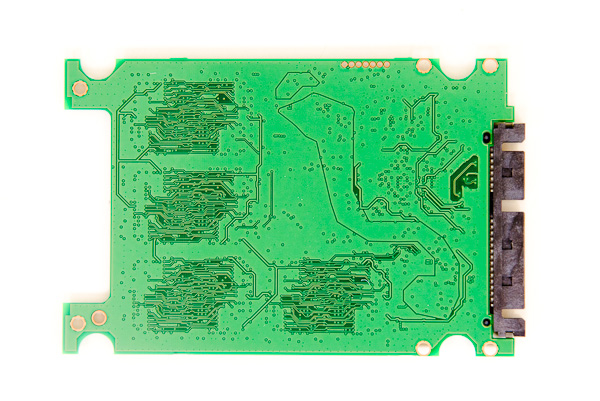
The 256GB SSD 840 Pro features 8 x 32GB NAND devices on the front of the PCB and nothing on the back
The 840 comes with a 3 year warranty compared to a 5 year warranty on the 840 Pro.
The 840 Pro drops the brushed aluminum look of the 830 for slightly more modern, flat black styling. The drives will be available in a 2.5" 7mm form factor, similar to the 830.
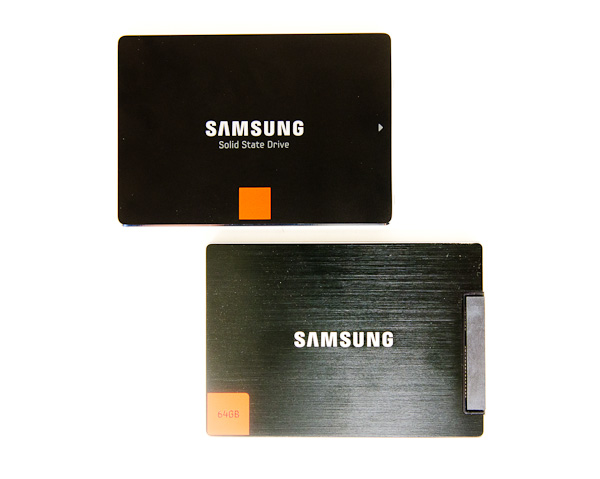
Samsung SSD 840 Pro (top) vs. Samsung SSD 830 (bottom)
Both drives will be available on October 15th, however in advance of the release Samsung provided us with a beta sample for review. We were only able to get a 256GB 840 Pro initially but we've already asked Samsung for additional capacities. The other bad news is after running through our client test suite and preparing the drive for a run through our enterprise suite, our pre-production sample died. This isn't the first time we've had an SSD die during our test process, pretty much every company has seen a failure during one of our reviews, but despite Samsung's excellent track record even it isn't immune from early issues. These drives are a few weeks away from retail and Samsung will be getting our sample back this week to figure out what went wrong.
Update: My replacement 840 Pro also died, I have shipped both drives back to Samsung and are waiting for their analysis of the failures.
Update 2: It looks like this may have been a firmware issue. Retail drives should ship with fixed firmware.
The Test
| CPU |
Intel Core i7 2600K running at 3.4GHz (Turbo & EIST Disabled) - for AT SB 2011, AS SSD & ATTO |
| Motherboard: |
Intel DH67BL Motherboard |
| Chipset: |
Intel H67 |
| Chipset Drivers: |
Intel 9.1.1.1015 + Intel RST 10.2 |
| Memory: | Corsair Vengeance DDR3-1333 2 x 2GB (7-7-7-20) |
| Video Card: | eVGA GeForce GTX 285 |
| Video Drivers: | NVIDIA ForceWare 190.38 64-bit |
| Desktop Resolution: | 1920 x 1200 |
| OS: | Windows 7 x64 |


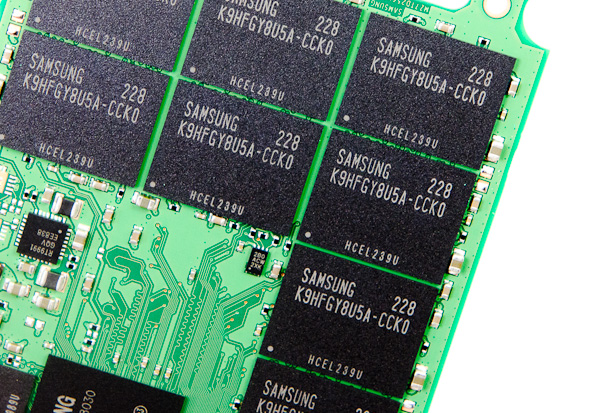
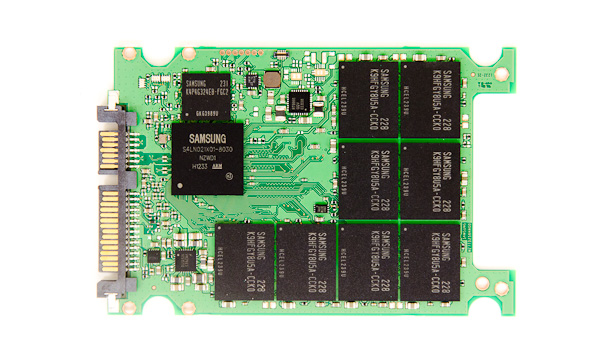
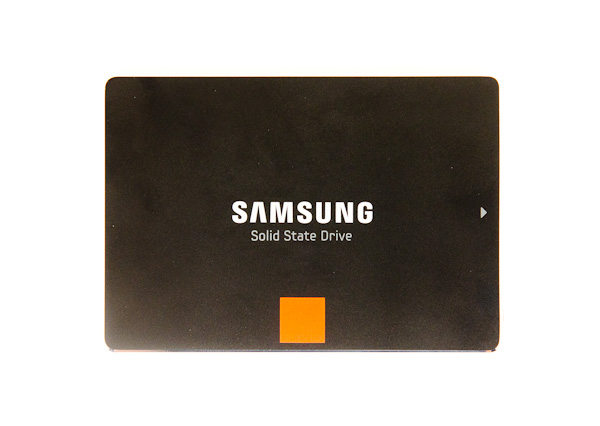








96 Comments
View All Comments
KPOM - Monday, September 24, 2012 - link
This looks like a nice SSD from Samsung offering top tier performance combined with low power consumption.nathanddrews - Monday, September 24, 2012 - link
Agreed. I love my Samsung 830 drives, so at least now I know where to go when I upgrade!Old_Fogie_Late_Bloomer - Monday, September 24, 2012 - link
I came THIS close to buying an 830 yesterday for my laptop. I even did a search for "Samsung 840" to see if there was any news of a successor, to no avail. Still, something stopped me from doing it, and it looks like my procrastination paid off...HisDivineOrder - Monday, September 24, 2012 - link
Exact same thing happened to me. Think the sales were just a little too good lately. Made me suspicious.Old_Fogie_Late_Bloomer - Monday, September 24, 2012 - link
Ha ha, come to think of it, I know exactly what you mean. And not that the 256GB 830 isn't a good deal at $200, but I think the improvements in the 840 Pro will be worth it.I wish I could justify the cost of a 500/512GB drive, but I can always throw my laptop's original HD in a hard drive caddy if I need more storage.
Grok42 - Monday, September 24, 2012 - link
Same here. I kept seeing the 830 show up in sales but couldn't find any rumors about a next generation drive. I've been putting off my new build for a while now. Prior to waiting on the 840 I waited for the next Nvidia release which ended up being the 660TI. I get everyone worry about a new SSD drive but by the time I actually pull the trigger on everything it will have been out a month and I'll know by then.TrackSmart - Monday, September 24, 2012 - link
If you can get the 830 at a massive discount, why not go for it? A couple of thoughts:1) I would never put a new-to-market SSD in on of my machines. It's not worth the risk. Check back in 6 months, or a year, and see how they have held up.
2) There's no discernible difference in performance among any of the top-tier SSDs under normal workloads. Anand and company make these drives jump through flaming hoops (i.e. their Bench suite) before they see differences between the drives under normal workloads.
I'd rather buy something that is fast, proven reliable, and at a good price. I'll let others be the crash test dummies for new SSDs.
Old_Fogie_Late_Bloomer - Monday, September 24, 2012 - link
Yeah, I thought about that, too. Why not go for a cheaper, proven drive that's nearly as fast? On the other hand, I bought a 320 based on its reputation for reliability, and a month later, bam, 8MB power bug, so you really never know.In my case, my laptop is not a mission-critical device; I have a desktop, as well as access to other laptops in the house, so if it suddenly needs service, it's not the end of the world. It's on me to do regular backups, and the 840 Pro has a FIVE YEAR warranty. So I think maybe I will be the crash test dummy this time, for the heck of it. Worst case scenario, I can always just toss the original hard drive back in there.
peterfares - Monday, September 24, 2012 - link
The thing is, you're not going to ever notice the difference between the 830 and the 840, or even the Crucial M4. I've seen the 256GB Crucial M4 for as low as $140 in the past couple weeks. That is a much better purchase than the 840 if the 256GB 840 is any more then $180 or so.Old_Fogie_Late_Bloomer - Monday, September 24, 2012 - link
Back when I got my Intel 320 SSD, I bought it because of Intel's reputation for reliability. Then they went with Sandforce controllers and I just don't trust them anymore. Meanwhile, Samsung also developed a reputation for reliability, and I'm inclined (perhaps unfairly) to trust them over other manufacturers.I'll be curious to see what Samsung and Anand have to say about the failure of the unit used for this review. I could still see going for the 830 if there's an indication that reliability HAS been compromised in some way.